Saturday, April 23, 2016 5:17:42 PM
Polish MPs pave way for bill to ban abortion
"Investigation finds Lithuania had secret CIA jails " .. Poland and Romania, too ..
By Adam Easton BBC News, Warsaw
8 April 2016
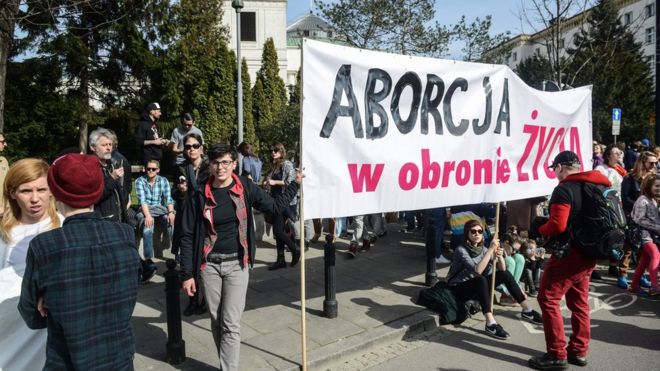
EPA
On 3 April there was a Warsaw rally against criminalising abortion
Polish MPs have paved the way for a citizens' bill that would ban abortion.
The "Stop Abortion" campaign now has approval to collect the 100,000 signatures needed to submit a bill to MPs. It has three months to do so.
The ruling Law and Justice party (PiS) has a parliamentary majority and promotes traditional Catholic values.
Currently abortions are only allowed in Poland in cases of rape or incest, if the mother's life is in danger, or if the foetus has medical problems.
PiS enjoys the support of many Polish Catholic bishops, and its leader, Jaroslaw Kaczynski, believes most of his party would vote for the bill.
According to the Polish Health Ministry, there were 977 legal abortions in 2014. Before the fall of communism in 1989 abortion was legal.
The citizens' bill proposes up to five years in prison for anyone who knowingly causes the death of an unborn child.
It stipulates that punishment for doctors and mothers can be waived in some cases, such as when the procedure was performed to save the mother's life.
The current law was adopted in 1993 after a very heated debate in parliament and the compromise has largely held since.
With PiS in office there may be room for change, such as tightening the law to outlaw abortions when the foetus has medical complications.
A recent opinion poll by CBOS suggests Poles are becoming less liberal on the issue. In 1992, 88% approved of abortions when the mother's life was threatened. By 2016, it had fallen to 80%. In cases of rape/incest approval fell from 80% to 73%, whereas in cases where the child would be born handicapped, it fell from 71% to 53%.
http://www.bbc.com/news/world-europe-35996313
If you would like to read more on today's Poland, that's great! .. please read on .. :)
Poles protest over PiS 'breaking constitution'
As protesters rally against the new government, we ask Poles for their views on the mood and challenges ahead
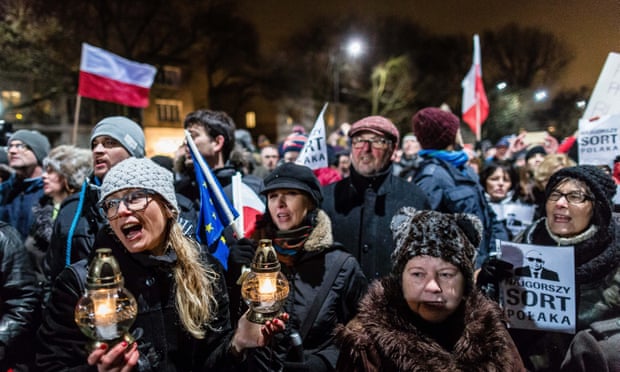
Anti-government protesters outside the Warsaw home of Jaroslaw Kaczynski, leader of Poland’s ruling Law and Justice (PiS) party in December. Photograph: Wojtek Radwanski/AFP/Getty
Tom Stevens
Friday 26 February 2016 23.56 AEDT
Last modified on Saturday 27 February 2016 02.21 AEDT
On Saturday 27 February the Committee for the Defence of Democracy .. http://komitetobronydemokracji.pl/ (KOD) are planning a “We, The People” march in Warsaw. The protest movement was formed in the wake of the Polish parliamentary elections in October 2015, when the rightwing Law and Justice .. http://www.theguardian.com/world/2015/oct/23/poland-election-law-and-justice-party (PiS) party became the first party in post-communist Poland to control an absolute majority of the seats in the Polish parliament and the presidency at the same time.
KOD has taken issue with a number of recent PiS initiatives, with the government recently passing bills curtailing the independence of the judiciary, media and civil service. Many protesters believe the bills are a threat to Polish democracy.
While recent decisions in parliament have caused alarm, there are also other issues facing Polish citizens. There’s a real concern about the country’s education system, the cost of living, the derogatory treatment of minority groups and the rise of youth movements siding with the far-right.
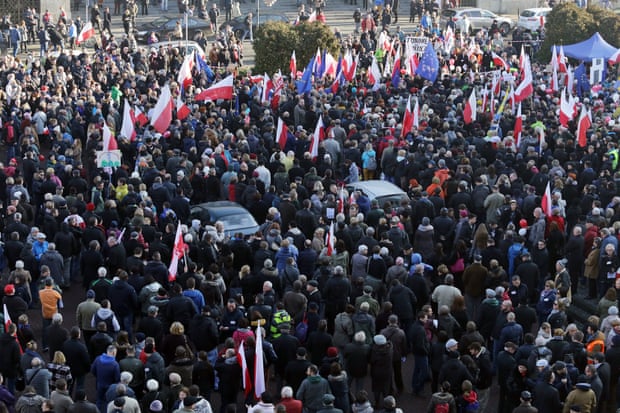
Protest held in Katowice by the Committee for the Defence of Democracy. Photograph: Dominik Gajda/Demotix/Corbis
‘The youth of the country is very rightwing and nationalistic’

Marcin Szymaniak
Marcin Szymaniak has lived in Warsaw all his life. Having worked many years as a news reporter for Zycie Warszawy and the rightwing pro-Law and Justice paper Rzeczpospolita, he now writes for history magazines and actively takes part in the KOD demonstrations. He is frustrated about the protests not having had the desired effect so far.
“Participants of anti-government demonstrations are mainly people from the larger cities, with a higher social and economic status then the average Polish citizen. Because of this I think the KOD demonstrations have been ineffective. Very few working class and young people are taking part. Young Poles are currently very rightwing and nationalistic.”
--
The conspiracy theorists who have taken over Poland
Read more .. http://www.theguardian.com/world/2016/feb/16/conspiracy-theorists-who-have-taken-over-poland
--
Marcin says it’s hard to avoid the hysteria in the Polish rightwing media about immigration. “PiS is perceived by its voters as the last barrier against the ‘Islamisation’ of Poland. Under the previous government Poland accepted to host 7,000 Syrian refugees. I don’t know what the PiS government plans on doing with that agreement. If they accept this decision, they could be easily attacked by the other far-right parties in parliament, like Kukiz’15. They are proposing a referendum on a complete immigration ban.”
Two of the major issues for people living in Poland are the low wages and job security. “A lot of Polish workers are on ‘trash job contracts’,” he says. “These are temporary jobs with no benefits or social security. Unfortunately, previous governments have been motivated by a neo-liberal ideology, turning a blind eye to some employers’ practices. Trade unions don’t exist in smaller Polish businesses, which means there’s no pressure from workers to change the current situation.”
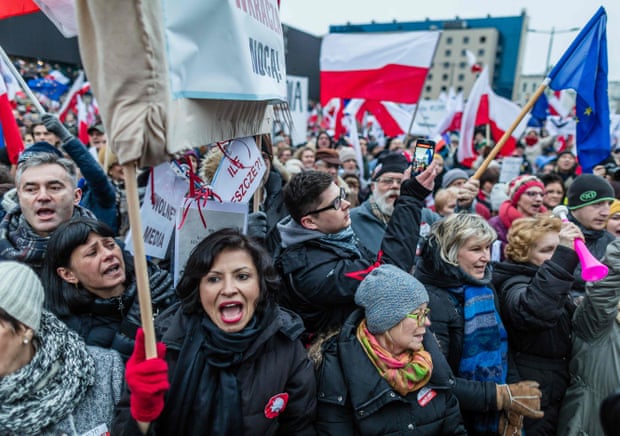
A protest against a new media law in Warsaw in January. Since returning to power in October, the PiS party has also imposed measures denounced as undermining judicial independence. Photograph: Wojtek Radwanski/AFP/Getty
A lot has been made recently about a new government scheme offering families an extra 500 zloty a month (about £90) for their second and every next child. Marcin explains the reasoning behind this scheme, and its possible flaws.
“PiS is very Catholic and closely linked to the church. They are entirely against abortion and contraception, and would ideally like to ban both. But the new 500-zloty scheme is flawed.
“A millionaire with two children will get this benefit, while a single mother with one child will get nothing. The government says it’s not a social-care programme but a family-support scheme. It’s obvious they want to support the old-style Catholic family model of a working man, a stay-at-home wife and a large amount of children.”
‘Their strong religious motivations mean minorities and the LGBT community are dismissed in a derogatory way’
Selia has also actively taken part in KOD demonstrations. She lives in the central Polish city of Kalisz, and recalls the atmosphere of a recent march she attended in Lódz. “It was very civil and easygoing. There were no hateful slogans. Everyone I met was simply unwilling to accept PiS breaking the constitution. The main problem is not the laws themselves, but the way they were passed.”

Leader of the ruling Law and Justice party, Jaroslaw Kaczynski, right, and the prime minister, Beata Szydlo, congratulate each other after MPs passed a new law on the constitutional court. Photograph: Alik Keplicz/AP
Selia says that when the previous government, Civic Platform (PO), was in power between 2007 and 2015, things were far from perfect, but she is concerned about how PiS is now marginalising minority groups in Poland.
“The main enemy of PiS are supporters of ‘gender ideology’ – basically everyone who is not living in a structured conservative family. The government is not a huge fan of equal rights, and I’m also worried about its association with radical youth organisations like ONR or Mlodziez Wszechpolska.
“These groups despise anyone who is different to them: immigrants, non-Catholics, liberals, the LGBT community and KOD protesters. I’m afraid because I think that’s how wars start.”
Hannah also strongly dislikes the way PiS is marginalising vulnerable minorities and the LGBT community. She recently witnessed the KOD demonstrations in the Sródmiescie district of Warsaw. “The Law and Justice party have won over a majority of voters by promising extra child benefits, free pre-school education and a universal healthcare system. But their strong religious motivations mean vulnerable groups in society and the LGBT community are dismissed in a derogatory way.
“They don’t want to legally recognise homosexuality and are against IVF treatment. They’re even calling for doctors who are involved with IVF to be imprisoned.”
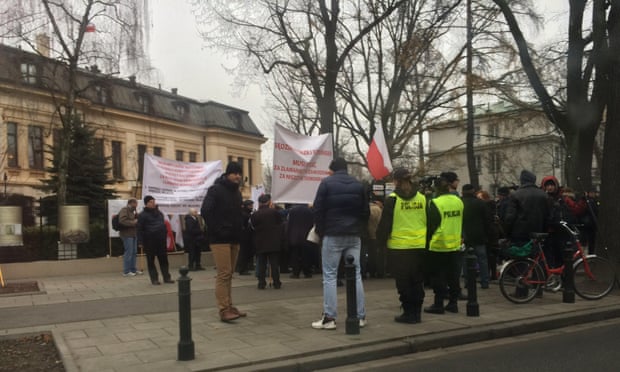
A recent demonstration in Sródmiescie, Warsaw. After winning an absolute majority in the lower house, the Law and Justice party can rule alone.
Hannah and her partner began IVF treatment themselves last November, when Civic Platform had just been voted out of power. Since then they feel the process has become very stressful. “When we started the treatment, the clinic we went to was very busy. Returning in January, at around the same time state-funded IVF cycles were stopped, the clinic was almost empty.
“Many couples were relying solely on state-funded IVF. This will damage Poland in the long run as the country’s birth rate is one of the lowest in Europe. We now have to attend official offices in the city to sign numerous documents stating that we are using IVF and that we are legally the parents. We feel we are being singled out.”
Having already gone through two IVF cycles, the first unsuccessful and the second ending in a miscarriage, Hannah and her partner are hoping it’s third time lucky. “We’re going to try again this April or May and fingers crossed, we get a much-wanted baby.”
--
Bernie Sanders' ancestral home in Poland grapples with painful history
Read more .. http://www.theguardian.com/us-news/2016/feb/24/bernie-sanders-poland-family-pride-presidential-run
--
‘Most people in Poland are not familiar with their legal rights’
Working as a business lawyer just outside Warsaw, Katarzyna finds the government’s paralysis of the country’s constitutional tribunal terrifying. “It’s the only body that can stop authorities from passing legislation that breaches the constitution. The changes that PiS have made mean people are left without the necessary protection provided by Poland’s laws.
“Police and other agencies can gather informations about citizens’ internet activity without any court order. Most people are not familiar with their legal rights. Eighty per cent of the population don’t know that they can appeal against a court judgment. I’m afraid that the average citizen will only notice a difference when they are faced with it personally.”
Despite her fears about the government’s recent actions in parliament, Katarzyna says living standards in Poland have improved in the last couple of decades. “Low salaries are still a problem, and some important professions are still being undervalued. But I believe Poland is still a developing country.
“When Poland became a democratic country, and implemented capitalism as its economic system 26 years ago, our debt was huge. The infrastructure was outdated, our agriculture was inefficient and most industries were overstaffed.
“Our standard of living was never going to match western standards after only 12 years of EU membership. The ‘older’ EU countries built their economies over a much longer time. Things have improved since the 90s, but it’s obvious that more needs to be done.”
Katarzyna feels there is room for improvement in the education sector. “As a mother of a primary school pupil, I have to say that the standard of teaching isn’t very impressive. Maybe this is a reflection on poor wages and employment conditions.”
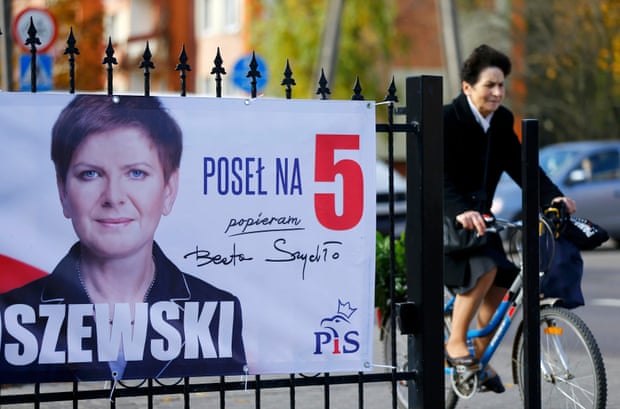
An election poster depicting the Law and Justice prime minister, Beata Szydlo, in Leczyca, Poland, in October. Photograph: Pawel Kopczynski/Reuters
Artur lives in the town of Jelenia Góra near the south-west city of Legnica, and he echoes the concerns over Poland’s education system. “I believe Poland needed fundamental change. But there is plenty for PiS to do to improve living conditions for Polish citizens. Teaching is the most undervalued profession in Poland, all the way up to higher education.
“There isn’t a single Polish university in the top 300 of any serious higher education list. This is due to mismanagement and a reluctance to accept organisational improvements, which is endangering bright young people’s further education and careers. A lot of Poland’s institutions, mechanisms, media and people of influence need to change.”
‘The real problem facing Poland is the cost of living’
Julian Gilbert has lived in Poland for the last 20 years and owns a firm teaching business English to organisations. He too has a child of primary school age, but is much more complimentary regarding the Polish education system. “My eldest son, Alex, is eight and I try to compare my friends’ experiences in the UK with here. Overall I think schools here are better, both academically and in terms of discipline.
“One big difference which might surprise people in the UK is that private schools are considered in Poland to be much worse than state schools. Here private schools are considered places [where], if you have enough money, you send your child if he or she isn’t brilliant academically.”
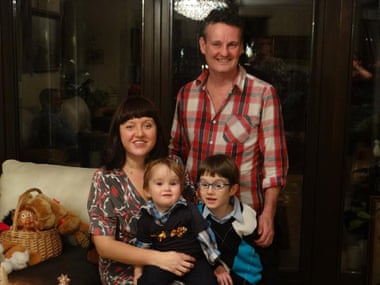
Julian Gilbert with his wife Kamilla and sons Ben, 2, and Alex, 8
Julian is originally from Southport but has settled in Gdynia with his Polish wife, Kamilla, and their two sons. He follows developments in parliament with interest, but fears that the issue concerning most citizens is being overshadowed by other matters.
“There is currently too much emphasis on issues like immigration, religion and historical events. The real problem Poland is facing is the cost of living. The prices of things like property are extremely high, and most people’s wages are simply too low to be able to afford them.
“Just 10 years ago property prices were within reach for average paid workers, but that isn’t the case any more. Public-sector workers are badly paid here [and] state schoolteachers, nurses, firemen and police. Pensions are also scandalously low. Even people with relatively good jobs find it hard to get by in Poland.”
While the city of Gdynia is generally well-off, Julian points out that there are big differences between the country’s regions. “Gdynia is a maritime city. The ferries to Sweden depart from here and that brings work and money into the region. Generally the eastern parts of Poland are poorer. And like most countries there’s a massive difference between the capital, Warsaw, and the rest of Poland.”
Despite these demographical gaps, Julian believes Poland is catching up with the older EU countries’ economies. “One of my clients in Gdynia is an IT firm that has become so successful it recently opened a branch in Silicon Valley. The young Polish guys who own it now have US workers in their employment.”
‘Wages in Poland are completely inaccurate compared to the personal economical freedom enjoyed by other Europeans’

Thomas Piatek
Thomas Piatek’s family live in a small southern Polish town near Oswiecim (Auschwitz). While he does not support the KOD protests, he too is concerned about the cost of living, and particularly feels the issue of state pensions needs to be addressed.
He says: “Jobs and wages in Poland are completely inaccurate compared to the personal economical freedom enjoyed by other Europeans. One reason being that Polish labour is still an attractive workforce for foreign investors who pay less money. Another reason is the current weak Polish zloty.
“Economical migration from Poland is still large. The largest and most underpaid sector is still healthcare. Doctors and nurses take weekend jobs in hospitals elsewhere in Europe, and earn the same amount of money they would have made working in Poland for a month.”
Pensioners in Poland seem to have been neglected by all previous governments, and are still seen as the biggest losers of the economic transformation that began 26 years ago. “Pensions are appalling,” says Thomas. “My mother, who worked under communist rule for 30 years, receives just 450 zloty a month [£80].”

Law and Justice party supporters campaigning in Warsaw in October. Photograph: Czarek Sokolowski/AP
Despite these concerns, he does not believe that PiS is threatening Poland’s democracy with the new laws. “The new legislations balance out the judicial part of government after the previous government Civic Platform [party] staffed it with their supporters. The Law and Justice party are simply reversing the original unconstitutional process, reinstating the balance and bringing back the democratic process.”
Thomas also suggests that PiS have plans for Poland’s future in the EU. “PiS is for Poland’s continued membership, but they want to level the field in terms of access to Polish labour and industrial infrastructure. They believe foreign companies should pay their fair share of the profits to the national treasury, and give something back to the country where they are becoming successful in business. This issue is not getting the attention it deserves.”
‘Presenting their own truth and possessing genes of betrayal’

Zbigniew Janik
One of the protesters’ primary concerns is the apparent curbing of Polish media by the government. Zbigniew Janik, who lives in Warsaw, argues that taking over public media is not uncommon among new Polish governments.
“This has become common practice in Poland after a new government is elected. The public broadcasting corporation Telewizja Polska has a large reach, therefore they also have the capacity to shape opinions. For this reason it’s an attractive target for any political party in power.
“The public media under previous governments were certainly biased, presenting just the one view on Polish politics. But commercial TV stations like Polsat offer an alternative view. Commercial media stations are usually still aligned with the previous governments’ views, whereas public stations reflect the views of the ruling party. They both present their own truth.”
Thomas Piatek agrees that government influence over public media is not a new phenomenon in Poland. “Every government in the past appointed key people in key positions within state-controlled media who supported the current establishment. This has never been an issue for the western media in the past, even when opposition parties have constantly raised the question.”

About 2,000 people protest outside a local public radio station over the new government’s curbs on media freedoms. Photograph: Beata Zawrzel/Demotix/Corbis
Katarzyna also points out that private broadcasters such as Polsat and TVN balance out public state media. Nevertheless, she is concerned about the state of public service broadcasting in Poland.
“Every Polish citizen who owns a television set is obliged to pay a fee that supports the public television broadcaster. That is one of the reasons why public TV and radio should be politically neutral. Instead it presents government propaganda to the public. New public television authorities, appointed by PiS, have already removed around 60 journalists across the board.
“And according to PiS chairman Jaroslaw Kaczynski, corresponding with foreign press proves that I have ‘a gene of betrayal’. I guess I have that gene.”
http://www.theguardian.com/world/2016/feb/26/poland-views-current-mood-constitution-challenges
"Investigation finds Lithuania had secret CIA jails " .. Poland and Romania, too ..
By Adam Easton BBC News, Warsaw
8 April 2016

EPA
On 3 April there was a Warsaw rally against criminalising abortion
Polish MPs have paved the way for a citizens' bill that would ban abortion.
The "Stop Abortion" campaign now has approval to collect the 100,000 signatures needed to submit a bill to MPs. It has three months to do so.
The ruling Law and Justice party (PiS) has a parliamentary majority and promotes traditional Catholic values.
Currently abortions are only allowed in Poland in cases of rape or incest, if the mother's life is in danger, or if the foetus has medical problems.
PiS enjoys the support of many Polish Catholic bishops, and its leader, Jaroslaw Kaczynski, believes most of his party would vote for the bill.
According to the Polish Health Ministry, there were 977 legal abortions in 2014. Before the fall of communism in 1989 abortion was legal.
The citizens' bill proposes up to five years in prison for anyone who knowingly causes the death of an unborn child.
It stipulates that punishment for doctors and mothers can be waived in some cases, such as when the procedure was performed to save the mother's life.
The current law was adopted in 1993 after a very heated debate in parliament and the compromise has largely held since.
With PiS in office there may be room for change, such as tightening the law to outlaw abortions when the foetus has medical complications.
A recent opinion poll by CBOS suggests Poles are becoming less liberal on the issue. In 1992, 88% approved of abortions when the mother's life was threatened. By 2016, it had fallen to 80%. In cases of rape/incest approval fell from 80% to 73%, whereas in cases where the child would be born handicapped, it fell from 71% to 53%.
http://www.bbc.com/news/world-europe-35996313
If you would like to read more on today's Poland, that's great! .. please read on .. :)
Poles protest over PiS 'breaking constitution'
As protesters rally against the new government, we ask Poles for their views on the mood and challenges ahead

Anti-government protesters outside the Warsaw home of Jaroslaw Kaczynski, leader of Poland’s ruling Law and Justice (PiS) party in December. Photograph: Wojtek Radwanski/AFP/Getty
Tom Stevens
Friday 26 February 2016 23.56 AEDT
Last modified on Saturday 27 February 2016 02.21 AEDT
On Saturday 27 February the Committee for the Defence of Democracy .. http://komitetobronydemokracji.pl/ (KOD) are planning a “We, The People” march in Warsaw. The protest movement was formed in the wake of the Polish parliamentary elections in October 2015, when the rightwing Law and Justice .. http://www.theguardian.com/world/2015/oct/23/poland-election-law-and-justice-party (PiS) party became the first party in post-communist Poland to control an absolute majority of the seats in the Polish parliament and the presidency at the same time.
KOD has taken issue with a number of recent PiS initiatives, with the government recently passing bills curtailing the independence of the judiciary, media and civil service. Many protesters believe the bills are a threat to Polish democracy.
While recent decisions in parliament have caused alarm, there are also other issues facing Polish citizens. There’s a real concern about the country’s education system, the cost of living, the derogatory treatment of minority groups and the rise of youth movements siding with the far-right.

Protest held in Katowice by the Committee for the Defence of Democracy. Photograph: Dominik Gajda/Demotix/Corbis
‘The youth of the country is very rightwing and nationalistic’

Marcin Szymaniak
Marcin Szymaniak has lived in Warsaw all his life. Having worked many years as a news reporter for Zycie Warszawy and the rightwing pro-Law and Justice paper Rzeczpospolita, he now writes for history magazines and actively takes part in the KOD demonstrations. He is frustrated about the protests not having had the desired effect so far.
“Participants of anti-government demonstrations are mainly people from the larger cities, with a higher social and economic status then the average Polish citizen. Because of this I think the KOD demonstrations have been ineffective. Very few working class and young people are taking part. Young Poles are currently very rightwing and nationalistic.”
--
The conspiracy theorists who have taken over Poland
Read more .. http://www.theguardian.com/world/2016/feb/16/conspiracy-theorists-who-have-taken-over-poland
--
Marcin says it’s hard to avoid the hysteria in the Polish rightwing media about immigration. “PiS is perceived by its voters as the last barrier against the ‘Islamisation’ of Poland. Under the previous government Poland accepted to host 7,000 Syrian refugees. I don’t know what the PiS government plans on doing with that agreement. If they accept this decision, they could be easily attacked by the other far-right parties in parliament, like Kukiz’15. They are proposing a referendum on a complete immigration ban.”
Two of the major issues for people living in Poland are the low wages and job security. “A lot of Polish workers are on ‘trash job contracts’,” he says. “These are temporary jobs with no benefits or social security. Unfortunately, previous governments have been motivated by a neo-liberal ideology, turning a blind eye to some employers’ practices. Trade unions don’t exist in smaller Polish businesses, which means there’s no pressure from workers to change the current situation.”

A protest against a new media law in Warsaw in January. Since returning to power in October, the PiS party has also imposed measures denounced as undermining judicial independence. Photograph: Wojtek Radwanski/AFP/Getty
A lot has been made recently about a new government scheme offering families an extra 500 zloty a month (about £90) for their second and every next child. Marcin explains the reasoning behind this scheme, and its possible flaws.
“PiS is very Catholic and closely linked to the church. They are entirely against abortion and contraception, and would ideally like to ban both. But the new 500-zloty scheme is flawed.
“A millionaire with two children will get this benefit, while a single mother with one child will get nothing. The government says it’s not a social-care programme but a family-support scheme. It’s obvious they want to support the old-style Catholic family model of a working man, a stay-at-home wife and a large amount of children.”
‘Their strong religious motivations mean minorities and the LGBT community are dismissed in a derogatory way’
Selia has also actively taken part in KOD demonstrations. She lives in the central Polish city of Kalisz, and recalls the atmosphere of a recent march she attended in Lódz. “It was very civil and easygoing. There were no hateful slogans. Everyone I met was simply unwilling to accept PiS breaking the constitution. The main problem is not the laws themselves, but the way they were passed.”

Leader of the ruling Law and Justice party, Jaroslaw Kaczynski, right, and the prime minister, Beata Szydlo, congratulate each other after MPs passed a new law on the constitutional court. Photograph: Alik Keplicz/AP
Selia says that when the previous government, Civic Platform (PO), was in power between 2007 and 2015, things were far from perfect, but she is concerned about how PiS is now marginalising minority groups in Poland.
“The main enemy of PiS are supporters of ‘gender ideology’ – basically everyone who is not living in a structured conservative family. The government is not a huge fan of equal rights, and I’m also worried about its association with radical youth organisations like ONR or Mlodziez Wszechpolska.
“These groups despise anyone who is different to them: immigrants, non-Catholics, liberals, the LGBT community and KOD protesters. I’m afraid because I think that’s how wars start.”
Hannah also strongly dislikes the way PiS is marginalising vulnerable minorities and the LGBT community. She recently witnessed the KOD demonstrations in the Sródmiescie district of Warsaw. “The Law and Justice party have won over a majority of voters by promising extra child benefits, free pre-school education and a universal healthcare system. But their strong religious motivations mean vulnerable groups in society and the LGBT community are dismissed in a derogatory way.
“They don’t want to legally recognise homosexuality and are against IVF treatment. They’re even calling for doctors who are involved with IVF to be imprisoned.”

A recent demonstration in Sródmiescie, Warsaw. After winning an absolute majority in the lower house, the Law and Justice party can rule alone.
Hannah and her partner began IVF treatment themselves last November, when Civic Platform had just been voted out of power. Since then they feel the process has become very stressful. “When we started the treatment, the clinic we went to was very busy. Returning in January, at around the same time state-funded IVF cycles were stopped, the clinic was almost empty.
“Many couples were relying solely on state-funded IVF. This will damage Poland in the long run as the country’s birth rate is one of the lowest in Europe. We now have to attend official offices in the city to sign numerous documents stating that we are using IVF and that we are legally the parents. We feel we are being singled out.”
Having already gone through two IVF cycles, the first unsuccessful and the second ending in a miscarriage, Hannah and her partner are hoping it’s third time lucky. “We’re going to try again this April or May and fingers crossed, we get a much-wanted baby.”
--
Bernie Sanders' ancestral home in Poland grapples with painful history
Read more .. http://www.theguardian.com/us-news/2016/feb/24/bernie-sanders-poland-family-pride-presidential-run
--
‘Most people in Poland are not familiar with their legal rights’
Working as a business lawyer just outside Warsaw, Katarzyna finds the government’s paralysis of the country’s constitutional tribunal terrifying. “It’s the only body that can stop authorities from passing legislation that breaches the constitution. The changes that PiS have made mean people are left without the necessary protection provided by Poland’s laws.
“Police and other agencies can gather informations about citizens’ internet activity without any court order. Most people are not familiar with their legal rights. Eighty per cent of the population don’t know that they can appeal against a court judgment. I’m afraid that the average citizen will only notice a difference when they are faced with it personally.”
Despite her fears about the government’s recent actions in parliament, Katarzyna says living standards in Poland have improved in the last couple of decades. “Low salaries are still a problem, and some important professions are still being undervalued. But I believe Poland is still a developing country.
“When Poland became a democratic country, and implemented capitalism as its economic system 26 years ago, our debt was huge. The infrastructure was outdated, our agriculture was inefficient and most industries were overstaffed.
“Our standard of living was never going to match western standards after only 12 years of EU membership. The ‘older’ EU countries built their economies over a much longer time. Things have improved since the 90s, but it’s obvious that more needs to be done.”
Katarzyna feels there is room for improvement in the education sector. “As a mother of a primary school pupil, I have to say that the standard of teaching isn’t very impressive. Maybe this is a reflection on poor wages and employment conditions.”

An election poster depicting the Law and Justice prime minister, Beata Szydlo, in Leczyca, Poland, in October. Photograph: Pawel Kopczynski/Reuters
Artur lives in the town of Jelenia Góra near the south-west city of Legnica, and he echoes the concerns over Poland’s education system. “I believe Poland needed fundamental change. But there is plenty for PiS to do to improve living conditions for Polish citizens. Teaching is the most undervalued profession in Poland, all the way up to higher education.
“There isn’t a single Polish university in the top 300 of any serious higher education list. This is due to mismanagement and a reluctance to accept organisational improvements, which is endangering bright young people’s further education and careers. A lot of Poland’s institutions, mechanisms, media and people of influence need to change.”
‘The real problem facing Poland is the cost of living’
Julian Gilbert has lived in Poland for the last 20 years and owns a firm teaching business English to organisations. He too has a child of primary school age, but is much more complimentary regarding the Polish education system. “My eldest son, Alex, is eight and I try to compare my friends’ experiences in the UK with here. Overall I think schools here are better, both academically and in terms of discipline.
“One big difference which might surprise people in the UK is that private schools are considered in Poland to be much worse than state schools. Here private schools are considered places [where], if you have enough money, you send your child if he or she isn’t brilliant academically.”

Julian Gilbert with his wife Kamilla and sons Ben, 2, and Alex, 8
Julian is originally from Southport but has settled in Gdynia with his Polish wife, Kamilla, and their two sons. He follows developments in parliament with interest, but fears that the issue concerning most citizens is being overshadowed by other matters.
“There is currently too much emphasis on issues like immigration, religion and historical events. The real problem Poland is facing is the cost of living. The prices of things like property are extremely high, and most people’s wages are simply too low to be able to afford them.
“Just 10 years ago property prices were within reach for average paid workers, but that isn’t the case any more. Public-sector workers are badly paid here [and] state schoolteachers, nurses, firemen and police. Pensions are also scandalously low. Even people with relatively good jobs find it hard to get by in Poland.”
While the city of Gdynia is generally well-off, Julian points out that there are big differences between the country’s regions. “Gdynia is a maritime city. The ferries to Sweden depart from here and that brings work and money into the region. Generally the eastern parts of Poland are poorer. And like most countries there’s a massive difference between the capital, Warsaw, and the rest of Poland.”
Despite these demographical gaps, Julian believes Poland is catching up with the older EU countries’ economies. “One of my clients in Gdynia is an IT firm that has become so successful it recently opened a branch in Silicon Valley. The young Polish guys who own it now have US workers in their employment.”
‘Wages in Poland are completely inaccurate compared to the personal economical freedom enjoyed by other Europeans’

Thomas Piatek
Thomas Piatek’s family live in a small southern Polish town near Oswiecim (Auschwitz). While he does not support the KOD protests, he too is concerned about the cost of living, and particularly feels the issue of state pensions needs to be addressed.
He says: “Jobs and wages in Poland are completely inaccurate compared to the personal economical freedom enjoyed by other Europeans. One reason being that Polish labour is still an attractive workforce for foreign investors who pay less money. Another reason is the current weak Polish zloty.
“Economical migration from Poland is still large. The largest and most underpaid sector is still healthcare. Doctors and nurses take weekend jobs in hospitals elsewhere in Europe, and earn the same amount of money they would have made working in Poland for a month.”
Pensioners in Poland seem to have been neglected by all previous governments, and are still seen as the biggest losers of the economic transformation that began 26 years ago. “Pensions are appalling,” says Thomas. “My mother, who worked under communist rule for 30 years, receives just 450 zloty a month [£80].”

Law and Justice party supporters campaigning in Warsaw in October. Photograph: Czarek Sokolowski/AP
Despite these concerns, he does not believe that PiS is threatening Poland’s democracy with the new laws. “The new legislations balance out the judicial part of government after the previous government Civic Platform [party] staffed it with their supporters. The Law and Justice party are simply reversing the original unconstitutional process, reinstating the balance and bringing back the democratic process.”
Thomas also suggests that PiS have plans for Poland’s future in the EU. “PiS is for Poland’s continued membership, but they want to level the field in terms of access to Polish labour and industrial infrastructure. They believe foreign companies should pay their fair share of the profits to the national treasury, and give something back to the country where they are becoming successful in business. This issue is not getting the attention it deserves.”
‘Presenting their own truth and possessing genes of betrayal’

Zbigniew Janik
One of the protesters’ primary concerns is the apparent curbing of Polish media by the government. Zbigniew Janik, who lives in Warsaw, argues that taking over public media is not uncommon among new Polish governments.
“This has become common practice in Poland after a new government is elected. The public broadcasting corporation Telewizja Polska has a large reach, therefore they also have the capacity to shape opinions. For this reason it’s an attractive target for any political party in power.
“The public media under previous governments were certainly biased, presenting just the one view on Polish politics. But commercial TV stations like Polsat offer an alternative view. Commercial media stations are usually still aligned with the previous governments’ views, whereas public stations reflect the views of the ruling party. They both present their own truth.”
Thomas Piatek agrees that government influence over public media is not a new phenomenon in Poland. “Every government in the past appointed key people in key positions within state-controlled media who supported the current establishment. This has never been an issue for the western media in the past, even when opposition parties have constantly raised the question.”

About 2,000 people protest outside a local public radio station over the new government’s curbs on media freedoms. Photograph: Beata Zawrzel/Demotix/Corbis
Katarzyna also points out that private broadcasters such as Polsat and TVN balance out public state media. Nevertheless, she is concerned about the state of public service broadcasting in Poland.
“Every Polish citizen who owns a television set is obliged to pay a fee that supports the public television broadcaster. That is one of the reasons why public TV and radio should be politically neutral. Instead it presents government propaganda to the public. New public television authorities, appointed by PiS, have already removed around 60 journalists across the board.
“And according to PiS chairman Jaroslaw Kaczynski, corresponding with foreign press proves that I have ‘a gene of betrayal’. I guess I have that gene.”
http://www.theguardian.com/world/2016/feb/26/poland-views-current-mood-constitution-challenges
It was Plato who said, “He, O men, is the wisest, who like Socrates, knows that his wisdom is in truth worth nothing”
Join the InvestorsHub Community
Register for free to join our community of investors and share your ideas. You will also get access to streaming quotes, interactive charts, trades, portfolio, live options flow and more tools.










